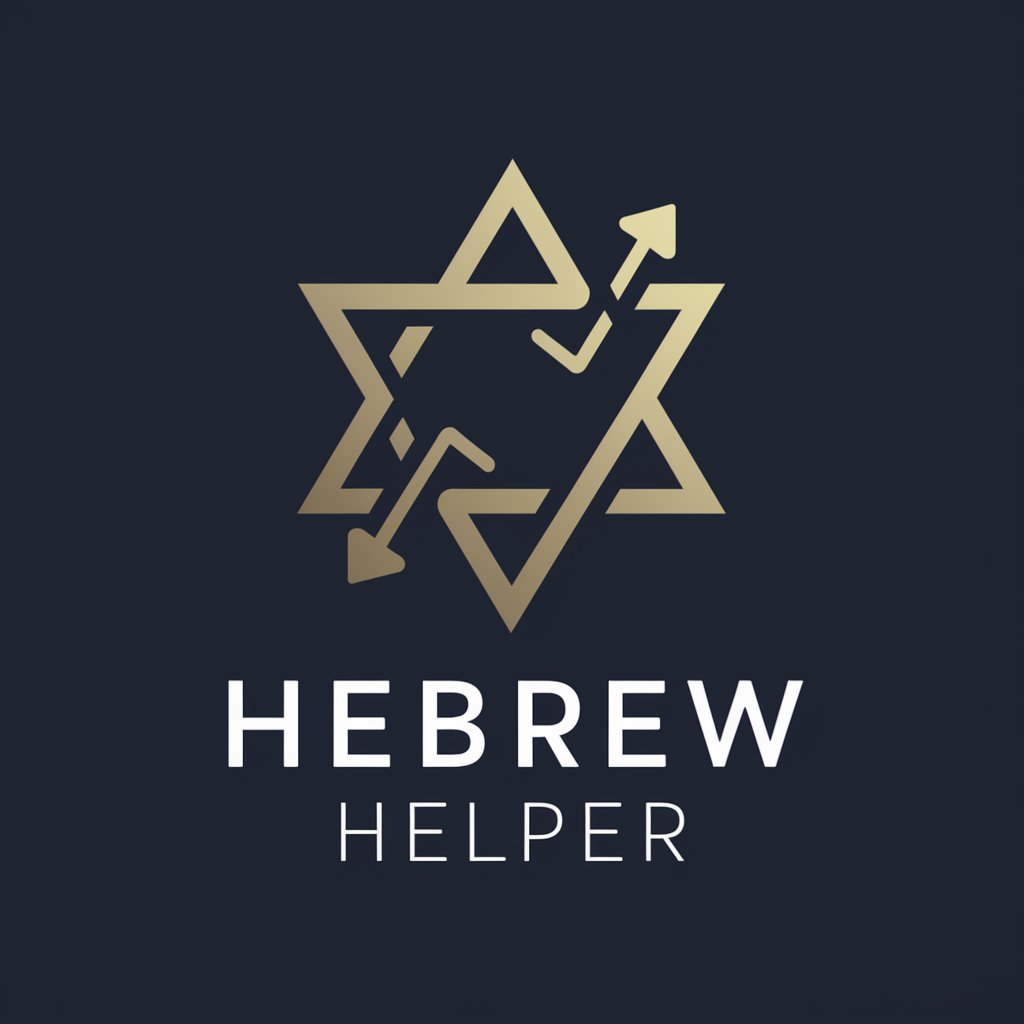
Hebrew Helper-AI Hebrew writing and translation
AI-powered Hebrew writing and translation.

Translate between Hebrew and English with ease. Simply put the text of either language and press enter! Specify if you are talking to a male or female when converting to Hebrew.
Get Embed Code
Hebrew Helper — short introduction and design purpose
Hebrew Helper is a language-support platform designed to make Hebrew accessible, accurate, and usable across real-life contexts — from casual chat to professional localization. Its core purpose is to bridge the gap between classroom textbook Hebrew and the living, colloquial Hebrew people actually use: slang, dialectal variants, register (formal vs informal), and culturally loaded expressions. The product combines contextual translation, register-aware transliteration, interactive conversation practice, grammar correction, and content-localization tools so users can understand, produce, and adapt Hebrew with confidence. Example scenarios: 1) Traveler: a tourist uses Hebrew Helper to get immediate, idiomatic translations of menu items and short spoken phrases, plus a pronunciation hint so they can order naturally in a cafe. 2) Expat / Heritage speaker: someone with Israeli family uses the tool to decode fast WhatsApp threads full of slang and emoji, seeing a literal translation, a natural English paraphrase, and notes on tone so they don’t accidentally sound rude. 3) Product team: a startup localizes its app strings using Hebrew Helper to produce gender-aware, culturally appropriate UI text and testsHebrew Helper overview the copy with in-app simulated dialogs to check how it reads in context.
Main functions and how they’re applied
Contextual translation and register-aware transliteration
Example
Input: a colloquial Hebrew message like 'מה קורה אחי, בא היום?'. Output includes: a natural English rendering ('What's up, bro — are you coming today?'), a literal word-for-word breakdown, notes on register/slang ('אחי' = 'my brother' used as 'bro' or close friend), and an optional phonetic transliteration showing casual pronunciation.
Scenario
Use case: an anglophone working with Israeli partners receives fast, casual Slack messages. Instead of a dry literal translation, Hebrew Helper provides the intended tone, how to reply in kind (or how to switch to a more formal tone), and example reply templates matched to the relationship (colleague vs close contact). This prevents misreadings that could be seen as too blunt or too familiar.
Interactive speaking practice with pronunciation feedback and role-play
Example
Feature: simulated dialogues (restaurant, job interview, landlord conversation) where the user speaks or types responses. The system evaluates pronunciation (common trouble sounds: ח/כ, צ/ז, r variants), offers corrective tips, and gives alternate natural responses depending on the level of politeness desired.
Scenario
Use case: a language student practices a job interview in Hebrew. Hebrew Helper role-plays the interviewer, highlights idiomatic phrases to sprinkle into answers, scores fluency and pronunciation on key words, and produces a short corrective plan (e.g., focus on verb conjugations in the past tense and practice rolling 'r' less forcefully).
Writing assistant, grammar correction, and culturally-aware localization
Example
Input: a draft marketing email or an app string. Output: corrected Hebrew with suggestions: clearer phrasing, gender-appropriate wording, localized idioms, A/B variations for tone (formal, neutral, playful), and a short explanation of why each change improves clarity/cultural fit.
Scenario
Use case: a SaaS product wants to add Hebrew support. The product manager inputs 50 UI strings and receives gender-neutral and gendered variants, notes on right-to-left layout implications, and a small QA checklist (dates, currency, local examples). This reduces rework from engineering and avoids cultural faux pas in copy.
Primary target user groups and why they benefit
Language learners and students (beginners → advanced)
Why they benefit: learners need more than literal translation — they need spoken practice, register-sensitive explanations, conjugation help, and clear examples that tie grammar to real usage. Hebrew Helper supports drills, personalized study plans, pronunciation feedback, and contextualized mini-lessons (e.g., 'how to speak to a landlord' vs 'how to text a friend'). It accelerates fluency by focusing on practical language tasks and common pitfalls (vowelless writing, gendered verbs/adjectives, slang).
Professionals, content creators, and bilingual communicators
Why they benefit: businesses, translators, product teams, and journalists need fast, reliable localization and tone control. Hebrew Helper reduces errors in public-facing content by offering idiomatic translations, gender-aware phrasing, and QA guidance for date formats, phone numbers, addresses, and cultural references. It also helps freelancers and translators produce consistent glossaries, match brand voice, and deliver contextual examples to clients.
How to use Hebrew Helper
Visit aichatonline.org for a free trial without login, also no need for ChatGPT Plus.
Open a modern browser (desktop or mobile). No account is required for the trial; just go to the site and start immediately. Basic prerequisites: internet connection and a browser. Optional: microphone/headphones for audio practice.
Choose a workflow and provide input
Pick the task type (translate, compose, proofread, practice). Paste text or type a prompt, or paste sample sentences for style matching. Specify source/target languages if translating and attach short context (audience, intended tone, level).
Set preferences and context
Select gender/address variants, tone (formal/colloquial), dialect or region if needed, and target proficiency (beginner/intermediate/advanced). Ask for transliteration, literal glosses, or explanatory notes when learning grammar.
Review, iterate, and export
Read suggested outputs, accept or edit lines, ask for alternatives (shorter, more formal, more casual). Use ‘explain’ to seeHow to use Hebrew Helper grammar reasoning, play TTS audio for pronunciation, then copy, download, or export text to your editor.
Optimize your results with best practices
Provide short examples of desired style, give explicit constraints (word limits, audience), request multiple variants for comparison, and avoid pasting sensitive personal or legal documents without review. Use iterative prompts (revise, simplify, expand) for better precision.
Try other advanced and practical GPTs
Profesor de Medicina Humana
AI-powered clinical reasoning, summaries, and materials

Especialista em Contabilidade, DP e RH
AI-powered Brazilian accounting, payroll & HR expert

チャットGPT
AI-powered chat that writes, codes, and teaches

Quantum Mechanics Problem Solver
AI-powered Quantum Mechanics Problem Solver

TOEIC & TOEFL Prep📚
AI-powered TOEIC & TOEFL practice with instant feedback

罵倒カフェの店員GPT(ツンデレ)
AI-powered tsundere café attendant delivering playful, customizable insults.

Planifica Pro"
AI-powered planning for smarter time management

EViews Helper
AI-powered econometrics assistant for EViews modeling

uText & Translate
AI-powered translation, rewriting, and localization

Visual Studio VB Expert
AI-powered VB.NET coding assistant

Finnish Grammar Expert
AI-powered Finnish grammar coach for learners

RISEN Prompt Engineer
AI-powered prompt design for precise outputs

- Academic Writing
- Translation
- Conversational Practice
- Pronunciation
- Vocabulary
Common questions about Hebrew Helper
What can Hebrew Helper do?
Hebrew Helper composes, translates, proofreads, and tutors Hebrew. It generates gender-aware phrasing, colloquial and formal variants, transliteration, pronunciation audio, verb conjugation tables, roleplay dialogs, vocabulary lists, and grammar explanations—useful for learners, teachers, writers, and translators.
How accurate and reliable are the translations?
For everyday text, social messages, blog posts, and study material it’s highly fluent and idiomatic. Accuracy depends on input clarity and context; always proofread critical or official documents. Use provided alternatives and request literal glosses or back-translations when you need closer fidelity.
How does it handle Hebrew gender and formality?
It produces gendered forms (verb endings, adjectives, pronouns) and can output multiple gender-address variants on demand. You can also set formality level so sentences use appropriate registers (colloquial Tel Aviv slang vs. formal modern Hebrew).
Does it support pronunciation and transliteration?
Yes — request phonetic transliteration and play synthesized audio to hear pronunciation. You can ask for slowed playback, syllable breaks, or example sentences to practice. Use these features to reinforce listening and speaking skills.
What about privacy, data handling, and pricing?
A free trial is available without login at aichatonline.org. For sensitive or legally-binding content, do not rely on automatic output without professional review. Check the service’s privacy policy for data-retention and processing details; paid subscriptions typically unlock batch exports, advanced features, and longer session history.





